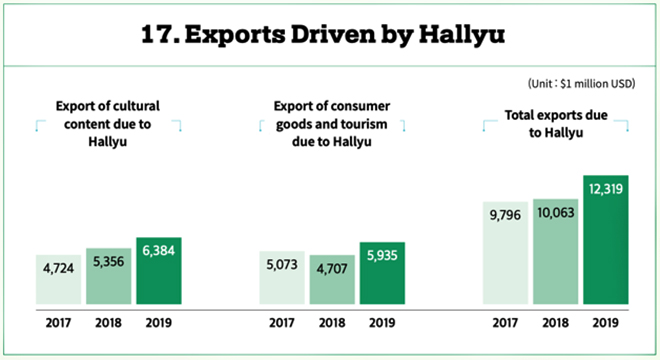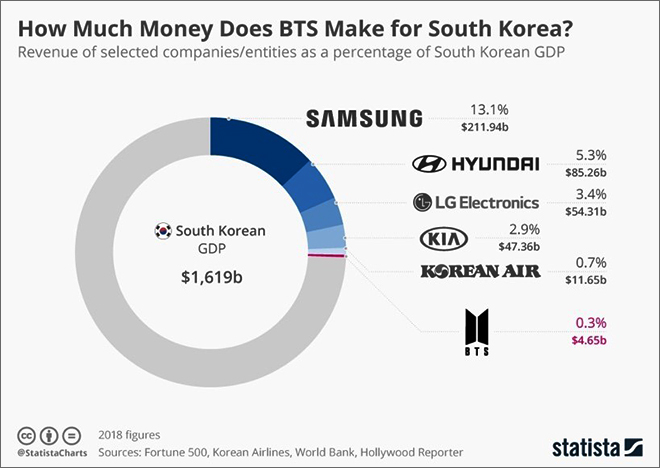
With its ubiquitous presence, it is hard to not be exposed to media and culture from South Korea. From television and cinema to music, food, skincare, and lifestyle, there is a growing Korean cultural influence in various sectors.
Joseph Nye defines “soft power” as, “the ability to get what you want through attraction rather than coercion or payments. It arises from the attractiveness of a country's culture, political ideals and policies”. By making the world see through K-tinted lenses, South Korea has created ‘Hallyu’—a Chinese word for South Korea's cultural wave. Through it, it has attempted to not only redefine—if not completely change—its international image, but also create strategic assets that further South Korean visibility world over. To understand Hallyu, it is crucial to understand the history of South Korea, specifically from the Sixth Republic.
By making the world see through K-tinted lenses, South Korea has created ‘Hallyu’—a Chinese word for South Korea's cultural wave.
Under the Sixth Republic
The Sixth Republic, considered to have begun in 1988, saw the country shift from a series of authoritarian regimes to a democratic one. The country opened up its economy, its press, and its borders. It also began to thaw its relationship with its neighbour North Korea. However, this growth met with a hurdle in 1997 during the Asian financial crisis, which was remedied by restructuring measures brought about by a bailout package given by the International Monetary Fund.
South Korea, thus, had two mutually compatible goals. The first, to generate revenue to help grow the South Korean economy, and second, to change its image globally while building relations with nations across the world. South Korea emerged out of its isolationist cocoon in the 1990s, and Hallyu was both a solution to several of its issues and crucial to the new identity that the country wanted to project.
For South Korea, Hallyu has ensured long-term viability and visibility across sectors. The letter “K” precedes several key industries today, turning it from a cultural one-off to a brand. South Korea does not hesitate to extend this brand to other sectors, with the South Korean President Moon Jae-in calling the COVID-19 pandemic quarantine a K-Quarantine. This has meant that Hallyu is not only destined to a similar fate as the many social media fads that came before it and will after, but it can also be seen as something that the world will engage with for time to come. This long-term engagement is sustained by Hallyu's close ties with the government. Hallyu is a state invention and has relied and continues to rely on the government's support and incentive. Last year, the Korean Ministry of Culture, Sports and Tourism announced that it would be establishing a Hallyu department under its ambit. However, while the Korean government attempts to showcase its ideal image through Hallyu, it would be hard to argue that it is only what the Korean government wants to show the world.
And this is, perhaps, why Hallyu has stood the test of global consumption. Usually, most cultural exports go through several levels of dilution to make them palatable to the world. The primary language of dissemination changes, tastes are changed and often, even names are changed to make it easier on the global mind and tastebuds. This has not been the case with Korean exports. Instead, the number of people learning the Korean language has gone up exponentially. Even food has survived, with kimbap not being conflated with sushi. An excellent example is the induction of 26 Korean words into the Oxford English Dictionary – including Hallyu. President Jae-in called the Korean language "Hangeul", the country's “soft power” in response to these additions.
South Korea emerged out of its isolationist cocoon in the 1990s, and Hallyu was both a solution to several of its issues and crucial to the new identity that the country wanted to project.
Today, Hallyu has not just served its intended purpose but has gone several steps further. It is being used as a weapon in North Korea, both overtly, when several concerts took place in the run-up to the 2018 peace talks; and covertly, as a tool to share the South Korean way of life. The popular band, BTS, performed and spoke at the United Nations General Assembly, promoting the 2030 SDGs as special presidential envoys. Such exposure is part of the Public Diplomacy Plan that was announced in 2017.
Reaping economic benefits
The total economic benefits of Hallyu are hard to estimate, given that it includes both the earnings that are directly through Hallyu and its indirect impact and the related effect on other industries such as through tourism, or an increase in sales of products promoted by Hallyu stars.
 Source: http://eng.kofice.or.kr/data/%202020%20Global%20Hallyu%20Trends.pdf
Source: http://eng.kofice.or.kr/data/%202020%20Global%20Hallyu%20Trends.pdf
A study by the Korean Foundation has shown that the direct impact of Hallyu has doubled from 2016 to 2019 and remains consistently on the rise and so has the indirect value (exports of consumer goods and tourism). The South Korean economy has been gaining from Hallyu and will continue to do so in the coming years.
While the Korean government attempts to showcase its ideal image through Hallyu, it would be hard to argue that it is only what the Korean government wants to show the world.
The “BTS effect”—used to summarise the effect that Bangtan Sonyeondan (BTS, the leading K-Pop band) has had can be easily used to understand Hallyu's impact on the Korean economy. Forbes estimated BTS’ contribution to South Korea's GDP to be higher than that of the GDP of Fiji, Maldives, and Togo individually. A study by the Hyundai Research Institute in 2018 estimated BTS’s direct economic value per year to be US $3.54 billion and indirect impact to be US $1.26 billion. In 10 years, the economic impact is expected to cross that of the PyeongChang Winter Olympics held in 2018, with almost zero investment compared to the Olympics. Further, one in every 13 foreign tourists visits South Korea because of BTS. The Seoul City administration credited BTS for the revival of its tourism industry after a dip in Chinese tourism caused by installing the THAAD system.
 Source: https://www.statista.com/chart/19854/companies-bts-share-of-south-korea-gdp/
Source: https://www.statista.com/chart/19854/companies-bts-share-of-south-korea-gdp/
Hallyu and its various aspects have become so popular today that their global network of fans (or Army, as the BTS Fanclub is called) often drives action and activism, despite some groups themselves remaining apolitical. During the 2020 Black Lives Matter protests in the United States, fans’ hashtags stormed racist surveillance networks, shared information and awareness, and collectively donated over US $1 million. The Chilean government blamed ongoing demonstrations and civil unrest on international K-Pop fans, given their role in questioning deaths, mentioning human rights violations and criticising silences. K-Pop is also now being used by the United Nations and other refugee agencies as a conversation starter amongst Syrian refugees in Algeria.
The Seoul City administration credited BTS for the revival of its tourism industry after a dip in Chinese tourism caused by installing the THAAD system.
However, while Hallyu has played a role in changing the image of South Korea, it cannot and should not be seen as a silver bullet to a diplomatic image. For instance, it will not erase the fact that the country is at war with its neighbour DPR Korea. As a country with military conscription, men between 18 and 28 must serve in the military. With several K-pop stars in that age category, there is a clash between the country's primary focus and global identity. While an age extension has been made possible, complete exemption would lead to a slippery slope for the rest of South Korean society.
Additionally, it showcases Korean society as is. Like other countries, South Korea also faces skewed growth, with the rich growing richer and the poor poorer. The quotidian lives of Korean society are the backdrop of K-Dramas such as ‘Squid Games’ (which includes references to real-life crackdowns on democratic protests) and movies like ‘Parasite’ that deeply engage with the class inequalities and income disparities.
In an article for Harvard's Belfer Center in 2009, Joseph Nye spoke of the potential of South Korean soft power. South Korea was slowly emerging as an important middle-ranking power for a nation that had been “dealt a weak hand” by geography. For Nye, “South Korea has the resources to produce soft power, and its soft power is not prisoner to the geographical limitations that have constrained its hard power throughout its history”, highlighting Korean culture as one of its many resources to gain soft power. Twelve years later, Hallyu is perhaps the most successful of the various resources South Korea has used to reinvent itself.
The views expressed above belong to the author(s). ORF research and analyses now available on Telegram! Click here to access our curated content — blogs, longforms and interviews.






 PREV
PREV

